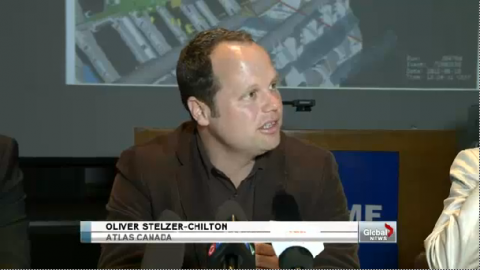
Oliver Stelzer-Chilton, TRIUMF Research Scientist and a member of the ATLAS experiment at CERN—which played an integral role in the discovery of the Higgs-like particle that was announced in early July—was recently elected as a member of the Institute of Particle Physics (IPP) council.
IPP is a Canadian organization that serves to maximize the impact of Canadian particle physics through the employ of an exceptional group of IPP research scientists that play key roles in the organization’s high priority projects and long-term planning goals. Oliver is one of eight exceptional research scientists from across Canada that serves as a council member of the IPP.
The IPP elects its council members on the recommendation of two current IPP members, the submission of a biography by each applicant, and then a vote that includes all IPP members. This year, there were two open position and four applicants.
It was formally announced at the Canadian Association of Physicists (CAP) conference in June that Oliver had been elected for a three-year term, in which the council will focus on grant proposals and long-range planning.
Oliver also plays a large role in the ATLAS experiment at CERN, as he functions as both a part of the management in the Exotics Group and, together with a local team from TRIUMF and Simon Fraser University, in a research capacity in the Higgs Group. In October 2011, he was appointed the Convener of the Exotics subgroup that focuses on exotics with leptons in it.
The Exotics group, Oliver explains, “started out with searches for new resonances that come about with physics beyond the standard model theories. Supersymmetry is so broad it deserves its own group, but anything else outside of the standard model falls within the purview of the Exotics Group, such as new particles, new resonances, extra dimensions, and black holes.”
As a Higgs-like particle was recently discovered, the ATLAS experiment has become a focal point for many Canadian news outlets, and with good reason, as Canadian science is makes up a fair portion of the enormous experiment. On Canadian involvement in ATLAS, Oliver says, “In terms of the detector, there is the hadronic end cap built here at TRIUMF, along with several components of the forward calorimeter. Those are substantial pieces of the calorimeter. We have monitoring responsibilities at TRIUMF, too. Several of these are critical components.”
Oliver has been involved with the ATLAS experiment on and off for over a decade, “In 2000, I did my masters on the Level-1 calorimeter at the University of Heidelberg in Germany for the detector component that Canada was building, then I went to the Tevatron for a long time for my Ph.D and post doc work. I returned to ATLAS when I came to TRIUMF, which was four years ago.”
On behalf of TRIUMF, we would like to congratulate Oliver for his election to the IPP council, and to the entire ATLAS team for having had a hand in one of the decade’s most important scientific discoveries.
To watch Oliver discuss the Higgs on GlobalTV, visit this link: http://www.globaltvbc.com/ubc+researchers+play+a+role+in+the+discovery+of+the+ever+elusive+god+particle/6442673310/story.html
